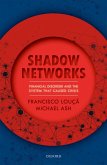The 2007-08 financial crisis surprised many economists and the public. But how did the crisis come about, why was it so deep, and why has the clean-up been so slow and painful? Many accounts of the crisis focus on renegade activity in marginal financial sectors. Shadow Networks challenges this pervading view and sets out to demonstrate that, far from a dissident branch, the shadow finance that initiated the crisis is tightly networked with, and highly profitable for, bank-based finance. The collapse was not an accident, but baked into the system of finance from the start. Shadow Networks traces the complex web of power that caused crisis and gives vivid descriptions of the actors in the quarter century leading up to 2007 to explain how the now decade-long crisis took shape. Shadow Networks: Financial Disorder and the System that Caused Crisis is a probing examination of the roles of the powerful elite. It traces the networks and institutions that support a finance-focused, market centered model of economy and society from their ascendancy to their surprising resilience in the face of manifest failures.
Dieser Download kann aus rechtlichen Gründen nur mit Rechnungsadresse in A, B, BG, CY, CZ, D, DK, EW, E, FIN, F, GR, HR, H, IRL, I, LT, L, LR, M, NL, PL, P, R, S, SLO, SK ausgeliefert werden.









